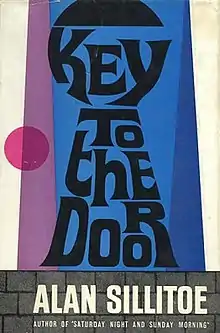Key to the Door
Key to the Door is a novel by English author Alan Sillitoe, first published in 1961.[1]
 First edition | |
| Author | Alan Sillitoe |
|---|---|
| Country | United Kingdom |
| Language | English |
| Publisher | W. H. Allen |
Publication date | 1961 |
| Media type | Print (Hardback & Paperback) |
| Pages | 446 pp |
| ISBN | 0333040619 |
| Preceded by | The General |
| Followed by | The Ragman's Daughter and other stories |
Synopsis
Key to the Door is the story of a young man growing up in the grim backstreets of Nottingham, England in the 1940s. He attempts to find a way of shaking off the stifling working class expectations that are thrust upon him from all sectors of society.[2] After leaving school for a soulless job in a cardboard factory and at 18 marries a girl who he has been in a relationship with for 3 years, and who he has made pregnant. He is finally called up for National Service and sent to Malaya during the Emergency where he finds himself an unwilling combatant against Chinese communists, whom he thinks of more as comrades in the class struggle rather than as enemies. Based in part on the author's own experiences in Nottingham and in Malaya, the novel was unfavourably compared to the author’s previous stories of working class life in Nottingham, Saturday Night and Sunday Morning and The Loneliness of the Long-Distance Runner, but proved popular enough to be reprinted in 1978.[3]
Relation to other books
Key to the Door is the second part of the Seaton family trilogy which commenced with Saturday Night and Sunday Morning (1958) although chronologically it is set before the earlier book. Critical response to the novel was largely negative.[4][5] The third book is The Open Door (1989).[6] In 2001 Sillitoe revisited the Seaton family in his novel Birthday, but this time the focus was on Arthur Seaton's brother Brian, a successful writer of TV sitcoms.
References
- James Campbell. "Profile: Alan Sillitoe | Books". The Guardian. Retrieved 24 August 2015.
- Sillitoe, Alan (1 November 2014). "KEY TO THE DOOR by Alan Sillitoe | Kirkus". Kirkusreviews.com. Retrieved 24 August 2015.
- Critical survey of long fiction: English language series Frank Northen Magill - 1991 - Page 3031 - What next for Brian Seaton? The Open Door, a novel which picks up the story of Brian Seaton at age twenty-one, articulates the vision Sillitoe struggled unsuccessfully to capture in the William Posters trilogy. Like Key to the Door, The Open Door has strong autobiographical overtones. Perhaps it supplies the answers about Smith and the Seatons more convincingly because it offers what Sillitoe has lived rather than what he has abstractly concluded. Upon his return from Malaysia, ...
- Contemporary Literary Criticism: Excerpts from Criticism of the ...Roger Matuz - 1990 0810344319 However, there are some less than subtle differences between this Brian and the Brian of Key to the Door. The Malayan communists, for example, have faded in his memory with remarkable rapidity. Is this Brian's or Sillitoe's own "retrospective falsification"? It hardly matters: The Open Door is so superior to Key to the Door that it would be worth destroying all trace of the latter. Indeed, Sillitoe may well have delivered himself of the autobiography of his immaturity in his account of Arthur ...
- Steven H. Gale -Encyclopedia of British Humorists: Geoffrey Chaucer to John Cleese 0824059905 1996 "Many of Sillitoe's subsequent novels are interrelated, even though some were published decades apart. Thus, for example, Brian Seaton, the semi-autobiographical protagonist of Key to the Door and The Open Door, is the older brother of Arthur Seaton; the first novel to have been written in what is now termed the "Seaton trilogy" is actually the third in the chronology of the plots. The novels of the "William Posters Trilogy," however, were published in chronological order— The Death of .